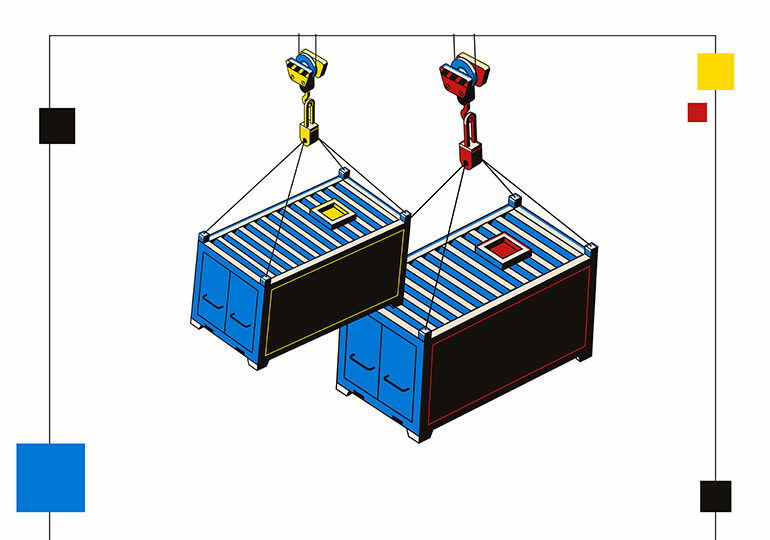The turnover of container shipments in the Black Sea region increased by 3% in 2021 compared to the previous year, which can be viewed as a sign of the revival of the pandemic-hit economy. Apart from Georgia, all countries in the region recorded an increase in the turnover of laden containers. Russia achieved the highest growth (12%), while Georgia recorded a loss of over 12%. In terms of container turnover, Ukraine retained the leading position among the countries of the Black Sea region (829,725 TEU), followed by Russia (660,581 TEU) and Romania (481,210 TEU).
The volume of imports in the aforementioned countries in 2021 increased by 2.4% year-on-year. Russia recorded the highest growth in imports (10.4%), followed by Romania (6.4%), Ukraine (5.6%) and Bulgaria (0.6%). In Georgia, the volume of imports fell by 17.8%. Exports from the Black Sea region increased by 2.9%, largely on the back of a 14.0% increase in Russia and a 14.2% increase in Georgia. The export of laden containers increased by 4.7% in Bulgaria, 3.9% in Ukraine and 1.3% in Romania.
Thus, the share of laden container shipment turnover by the country for 2021 looks as follows: Ukraine – 34.21%; Russia (Novorossiysk) – 27.23%; Romania – 19.84%; Georgia – 10.20%; Bulgaria – 8.52%.
Although 2021 was crucial in terms of exiting the pandemic and the prolonged period of restricted commercial activity that went with it, 2022 has now presented new challenges. The full-scale invasion of Ukraine by Russia on the 24th of February this year has had an immediate impact not only on Ukraine but also on the Black Sea region as a whole. The war has brought the Ukrainian economy to a standstill. Seaports are unable to operate and receive commercial vessels, meaning that the country is unable to trade with its commercial partners. Since Ukraine accounts for around a third of all container turnover in the Black Sea basin, the war will severely affect the region and reduce total container turnover by up to 35%. The conflict has caused significant delays in the regional supply chain of the Black Sea basin and created operational difficulties such as the need to reroute Ukrainian imports to other countries in the region and use alternative means of transport. Naturally, this has increased the cost of storing containers laden with Ukrainian imports. More specifically, altering the purpose of empty containers is causing problems in the supply chain that will inevitably exceed regional boundaries and assume a global dimension.
Some Ukrainian import/export cargo has been rerouted to Romania, putting a strain on the port of Constanta. Ukrainian cargo owners are actively trying to resell their goods to Romania and Moldova. The pressure on the port of Constanta is also exacerbated by humanitarian cargo. A significant part of Ukrainian imports has been temporarily stored in Turkish and Georgian ports
It is important to note that Russia – who started the war against Ukraine – plays a key role in the Black Sea region through the port of Novorossiysk. Against the background of international sanctions being imposed on Russia, container turnover in Novorossiysk is likely to decrease dramatically (only food, humanitarian cargo and medical supplies are currently allowed). Due to the sanctions, leading maritime container lines are refusing to accept cargo originating from Russia. We can, therefore, expect container turnover in the Black Sea basin to decrease by around 25%, and for monthly turnover in the region to fall by up to 60% (depending on how long the conflict and sanctions will last), with internal shipments between the countries of the region accounting for approximately 8%, and ocean shipping to the countries of Asia, Europe, the Americas and Africa accounting for the remaining 52%.
In addition to affecting the shipment of cargo of Russian origin, the sanctions against Russia also have a significant negative impact on the cargo turnover and container services of neighbouring countries. The countries of the Caucasus and Central Asia are clear examples of this, as the Black Sea basin represents a gateway for them to trade with the rest of the world. There is an abundance of Russian investment and assets owned by sanctioned Russian businesspeople in the countries of the region. The current restrictions are preventing the aforementioned companies from transporting their cargo. Global maritime companies are not serving these firms, thereby further reducing container turnover. This particular issue can be resolved relatively easily by reorganizing the shareholder structures of these companies.
In the long run, Russian aggression in Ukraine will impact container traffic in the Black Sea region in several ways. It is currently impossible to accurately predict the extent of damage that will be sustained by these countries. The damage can only be evaluated postfactum, once we have the container turnover figures for the period in question.
To counterbalance the abovementioned challenges, it is important to also highlight the potential opportunities that will arise because of the imposition of sanctions on Russia. Specifically, the Trans-Siberian Railway Corridor, which is currently the largest transit route connecting Europe and Asia, is expected to become unreliable, leading to the collapse of the corridor. This would mean that the new Silk Road transit corridor will see significantly higher activity. For China, the KazakhstanAzerbaijan-Georgia transit corridor could become the only alternative route for the fast shipment of Chinese and European cargo, meaning that more cargo will be processed by ports in Georgia, Romania and Bulgaria.
Sanctions against Russia and the closure of the ports of St. Petersburg and Novorossiysk, which were handling the exports and imports of the countries of Central Asia (Kazakhstan, Turkmenistan, Tajikistan, and Uzbekistan), will inevitably lead to the transfer of these transit cargoes to ports in Georgia, Romania and Bulgaria. Ultimately, this will increase the turnover of container shipments in the Black Sea region. It is far from certain that the Russian and Ukrainian cargo routes can be replaced in full or even in part, but the previously mentioned opportunities will definitely serve as an additional incentive for maintaining an intensive container shipping operation in the region. Finally, I wish to express my hope that the Ukrainian economy will recover soon, and its maritime infrastructure will restart operating with even more intensity than before, thereby strengthening the position of the Black Sea region in the global supply chain.

















